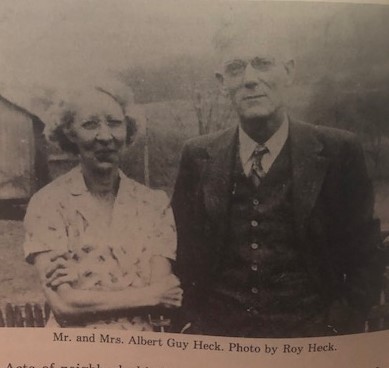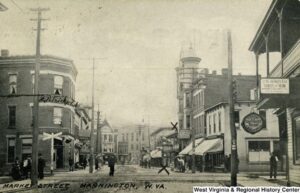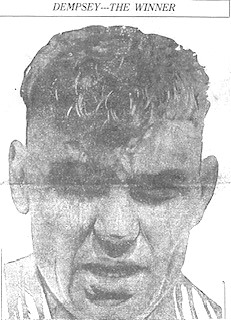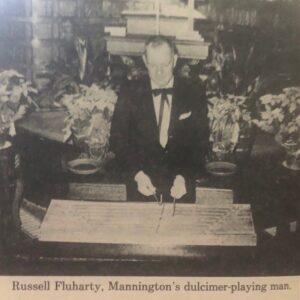
Radios, we listened to them almost every day when I was younger. I know that things are changing, and with our phones and other devices, radios are becoming a thing of the past. In the Twenties and Thirties, they were a lifeline to the outside world if you could afford one. Not everyone could.
There is a town in my home state of West Virginia called Mannington. In its day, it was a big oil and gas town. People cared about each other and did everything possible to help a neighbor. This is a story about a man that cared about his neighbors so much he connected with them all.

Albert Guy Heck was born on December 14, 1886, in Marion County, W.V. The family he was born into had been farmers as far back as anyone could remember. As he grew up, Albert had no ambition to become a farmer. His interest lay in mechanics and electricity. He had a very scientific mind.
In his teenage years, he became fascinated with photography. Buying some equipment from a mail-order business, he started taking pictures and even developed the pictures he took using the glass plates that came with his order. He became very accomplished at it.
The pride he took in his pictures aided him to move on to something else. Teaching himself the International Code and Morse Code led him to become a ham radio operator. This was a hobby that he held for many years. Being so proficient in using the codes, he became a telegraph operator for the B&O Railroad and was stationed at Glovers Gap, Barrackville, and Farmington. These were little cities surrounding Mannington. Later his next appointment would be at Telegraph Tower at the intersection of the railroad and Water Street in Mannington in 1917. During this time, Albert got the idea of using his radio to help a sick couple in his town. To be unwell and have nothing to occupy your time is always miserable. So Albert connected a line to his radio, ran it to the sick couple’s house, and attached a headphone to hear with. He would turn on his radio, and whatever he could tune in to, the sick couple could also listen to.
Because only one person could listen at a time, a couple of days later, he took a horn from a phonograph, connected it to the wire, and made it an amplifier so both could hear at the same time.
His experiment worked so well that another ailing neighbor asked if he could do the same for him a year later. He obliged. What a great friend and neighbor he was.

In 1921 “The Fight of the Century” was happening in Jersey City, New Jersey, between “World Heavyweight Champion” Jack Dempsy and “World Light Heavyweight Champion” Georges Carpentier. It seemed like everyone in the country was excited about this bout.
Albert was no exception. He wanted to broadcast this fight so that all had a chance to hear what might be “The Fight of the Century, so he hooked up a large amplifier and ran it out into the street. He hoped that they could hear the bout as it was being broadcast directly from the arena. I don’t know if this actually worked, but I hope it did. By the way, Jack Dempsey won!
By the end of 1924, nine other neighbors had been connected to Heck’s radio. It didn’t stop there either; people from other areas around Mannington wanted the same deal. These were people from Brush Run, Flaggy Meadow, and Salt Lick. These areas are a little farther from Heck’s; connecting them took more wire.
Albert’s sons Clyde, Roy, and younger son Richard helped with the installation and repairs, which kept them quite busy, so they needed more help, and Albert hired a man by the name of Jesse Wilson.
Until this time, Arthur used all his money and equipment to do the hook-ups, and now he was running out of each. Furthermore, with more hook-ups, he needed to build a bigger radio to handle the growing masses.
Because the programs that ran on the radio were not something Heck had anything to do with, he felt charging people wasn’t an option. He had quite the dilemma. Meanwhile, a few local citizens saw him struggling to keep providing this service and took it upon themselves to create an organization called ” Heck’s Radio Society.” It was spearheaded by a man named Harry Green, who was elected president of this group.
The organization talked to Heck and explained that he was providing a service just like a grocery store or railroad. No one would be able to use these benefits if not for paying when in use. It was decided that from now on, anyone using the lines from the radio would have to pay a membership fee and buy their own loudspeakers and equipment; with this, Heck would provide service to the customers. The new business was called “The Heck Line.”
Even with the introduction of having to pay a fee, the line expanded quickly, and the men could hardly keep up.
In the Twenties, programs during the daytime were few and far between. Other new obstacles that happened to hold up listening were the strength of the signal and the weather. You might only get static if a strong storm or high winds existed. But like anything else that was new, it has its ups and downs.
Along with the problems that could cause trouble, a show that was being broadcast might have to be switched mid-show if the signal wasn’t strong enough. In fact, in 1926, a severe snowstorm knocked out all programming for a while due to static discharges.
Heck couldn’t do anything about the weather, so he came up with the idea of broadcasting local talent and playing records. These programs were put on at the Heck home and broadcast to all the listeners.
Some of the first shows to air were: Talks About Health by Dr. Phoebia G. Moore and Miss Louise Kochert, a local school nurse. The school children and local singers provided music. There were also talks from noted Mannington leaders. This was a very popular feature of the system and broadened quickly. Here are a few more noted performers: Russell Fluharty was accomplished in many different instruments, but he was especially noted for his playing of the hammered dulcimer. He was a favorite. The West Virginia Culture Center, KDKA”s Wilkins Amateur Hour, and the David Frost Show were just a few of his many performances.

When spring rolled around, the newly called Heck’s Broadcasting System, located on Burts Hill, started to feature Sunday night church sermons across the radio. With newly purchased wireless equipment, this was possible. They were to go on and broadcast morning and evening sermons. They also started to have people advertise their business. The first to do this was Ira Ice’s Grocery Store-Meat Market. I’m sure hearing your name on the radio was a thrill. Local news was added at six o’clock each evening, so It was possible now to keep up with all the happenings around town.
Sports, always a popular topic, started to be put in the line-up in 1928. The announcers for these programs were Roy Arnett, Clyde Heck, and Cassy Ryan. They would relate what was going on at the surrounding high schools. The high school coaches would come on the day before games and try to fluster the other teams by stating how good their team was and if there were any injuries. Heck had, at this time, around 200 members.
As much as everyone enjoyed being able to have all these programs to listen to, the old adage, “You can’t please everyone all the time,” started to rear its ugly head. Mr. Heck was the programming director because he was the operator of the radio. He chose what people could or could not listen to. With people paying a subscription fee now, they felt they should have a say also to what they listened to. Heck thought about this and placed a wired panel at each listener’s house. On this panel, they had an on-and-off switch. If they didn’t wish to listen to the show at that time, flip the switch to off. It also had a buzzer that people used when they needed to get a hold of Heck and let him know their opinion of a show. Besides the programming, Mr. Heck and his sons were kept busy maintaining the lines. His friend Mr. Wilson was now a paid employee of the business.
Now on to the Thirties. Radios had come a long way, and many could purchase their own. These radios were large and bulky and needed many different batteries, and they were expensive. At a house with no commercial electricity, they had to lug a very large dirty battery to a garage to recharge; that would have been a daunting chore in winter. Radios operating directly from power lines weren’t available until the late Thirties.
Because of the cost and inconvenience of owning your own set, people stayed with the Hecks.
Then came World War II. During the war, everyone was worried about the wrong person or group listening in and finding out information not meant for them, so the government banned all amateur radios. This was a huge setback.
After the war, people had more home phones, and telegraphs were phased out. Not one to let an opportunity go by, Mr. Heck used the abandoned telegraph wires to expand his audience. His customers were paying 1.50 a month, and now with the new lines, for some reason, he lowered their payments to 2.00 every quarter. He was scientifically brilliant but not business savvy.
There was a movie theater in Mannington called Burts Theater. Until this time, they only had silent movies. When the talkies came along, Mr. Burt had the equipment installed. The technician who put it in couldn’t get the sound to amplify and said it would be another two days to get someone else out to work on the problem. No, that couldn’t happen; he had already advertised the first talking movie for that night. He told the boy not to worry about sending someone else. He had a man in town that could fix the problem. Mr. Heck to the rescue. He came and looked over the system, found the problem, and the show went on as planned. When it came to electrical or mechanical problems, Albert was your man.
The next big thing for Mr. Heck was when he was asked to wire the grounds behind the Bartletts Hotel for the first Mannington Fair. [the fair still runs to this day, just in a different part of town at Hough Park] He did the electrical wiring and even put in one of his lines and an amplifier so the crowds could enjoy music as they had fun at the fair. He could have been a very wealthy man, but he just; liked the idea of other people enjoying his work. This all happened around 1932.
Albert worked hard and enjoyed everything he had accomplished, but around 1934 his family asked him to give up his line. More broadcasting stations were more powerful than his, and radios were now priced so that, rich or poor, most folks could afford them. With Albert still using his own money to subsidize the business, it was really affecting his family. He stopped managing the business and just let his friend Jesse Wilson run it until finances forced the closing of the Heck Line in 1939.
Albery passed away in 1969, and I’m sure wherever he is, he’s still trying to make things better.
This story today is for my friends in Mannington, W.V. I hope they enjoy it.
Thank you for coming on another journey with me into the history of Marion County, W.V. If you could leave a comment below and tell me what you like or what I could do to improve the blog, I would appreciate it. Your feedback really helps!
Remember: History is the spine of America. We will collapse and fall if we do not learn and lean on it.

Very Interesting 2 of my aunts were in a band called Prairie something (maybe drifters) anyway they often performed on Hecks Radio Program
First Thank you for your comment. How interesting that you actually had relatives on his show. I bet they were a big hit
Great story. Albert Guy was my uncle and I have heard many stories about him and his family. One part of your article that I heard differently was the buttons that were added. They were for the listener to be able to vote on what they wanted to lister to that night. Early in the evening someone (usually one of his daughters) would go on line and give 3 or 4 options. than would name one an if you wanted to hear that one you selected yes after all were voted on the one with the highest votes would be what was tuned in that night. Majority ruled.
Thanks for the comment and I went back and checked my information and what I printed was what i had but what you are saying makes more sense. With it being a family story they would know more than something that was written about him in a newspaper. Glad you liked the story!